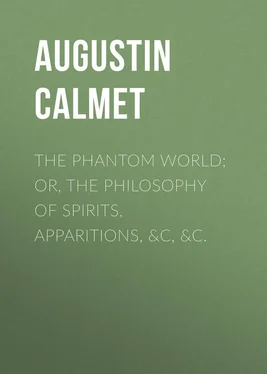Augustin Calmet - The Phantom World; or, The philosophy of spirits, apparitions, &c, &c.
Здесь есть возможность читать онлайн «Augustin Calmet - The Phantom World; or, The philosophy of spirits, apparitions, &c, &c.» — ознакомительный отрывок электронной книги совершенно бесплатно, а после прочтения отрывка купить полную версию. В некоторых случаях можно слушать аудио, скачать через торрент в формате fb2 и присутствует краткое содержание. Жанр: foreign_antique, foreign_prose, на английском языке. Описание произведения, (предисловие) а так же отзывы посетителей доступны на портале библиотеки ЛибКат.
- Название:The Phantom World; or, The philosophy of spirits, apparitions, &c, &c.
- Автор:
- Жанр:
- Год:неизвестен
- ISBN:нет данных
- Рейтинг книги:3 / 5. Голосов: 1
-
Избранное:Добавить в избранное
- Отзывы:
-
Ваша оценка:
- 60
- 1
- 2
- 3
- 4
- 5
The Phantom World; or, The philosophy of spirits, apparitions, &c, &c.: краткое содержание, описание и аннотация
Предлагаем к чтению аннотацию, описание, краткое содержание или предисловие (зависит от того, что написал сам автор книги «The Phantom World; or, The philosophy of spirits, apparitions, &c, &c.»). Если вы не нашли необходимую информацию о книге — напишите в комментариях, мы постараемся отыскать её.
The Phantom World; or, The philosophy of spirits, apparitions, &c, &c. — читать онлайн ознакомительный отрывок
Ниже представлен текст книги, разбитый по страницам. Система сохранения места последней прочитанной страницы, позволяет с удобством читать онлайн бесплатно книгу «The Phantom World; or, The philosophy of spirits, apparitions, &c, &c.», без необходимости каждый раз заново искать на чём Вы остановились. Поставьте закладку, и сможете в любой момент перейти на страницу, на которой закончили чтение.
Интервал:
Закладка:
We often see on medals the inscription, Genio populi Romani; and when the Romans landed in a country, they failed not to salute and adore its genius, and to offer him sacrifices. 75 75 "Troja vale, rapimur, clamant; dant oscula terræ Troades." — Ovid. Metam. , lib. xiii. 421.
In short, there was neither kingdom, nor province, nor town, nor house, nor door, nor edifice, whether public or private, which had not its genius. 76 76 "Quamquam cur Genium Romæ, mihi fingitis unum? Cùm portis, domibus; thermis, stabulis soleatis, Assignare suos Genios?" — Prudent. contra Symmach .
We have seen above what Jamblichus informs us concerning apparitions of the gods, genii, good and bad angels, heroes, and the archontes who preside over the government of the world.
Homer, the most ancient of Greek writers, and the most celebrated theologian of Paganism, relates several apparitions both of gods and heroes, and also of the dead. In the Odyssey, 77 77 Odyss. XI. sub. fin. Vid. Horat. lib. i. Satire 7, &c.
he represents Ulysses going to consult the sorcerer Tiresias; and this diviner having prepared a grave or trench full of blood to evoke the manes, Ulysses draws his sword to prevent them from coming to drink this blood, for which they thirst; but which they were not allowed to taste before they had answered the questions put to them. They believed also that the souls of the dead could not rest, and that they wandered around their dead bodies so long as the corpse remained uninhumed.
Even after they were interred, food was offered them; above everything honey was given, as if leaving their tomb they came to taste what was offered them. 78 78 Virgil. Æneid. I. 6. August. Serm. 15. de SS. et Quæst. 5. in Deut. i. 5 c. 43. Vide Spencer, de Leg. Hebræor. Ritual.
They were persuaded that the demons loved the smoke of sacrifices, melody, the blood of victims, and intercourse with women; that they were attached for a time to certain spots and certain edifices which they infested. They believed that souls separated from the gross and terrestrial body, preserved after death one more subtile and elastic, having the form of that they had quitted; that these bodies were luminous, and like the stars; that they retained an inclination for those things which they had loved during their life on earth, and that often they appeared gliding around their tombs.
To bring back all this to the matter here treated of, that is to say, to the appearance of good angels, we may note, that in the same manner that we attach to the apparitions of good angels the idea of tutelary spirits of kingdoms, provinces, and nations, and of each of us in particular – as, for instance, the Prince of the kingdom of Persia, or the angel of that nation, who resisted the archangel Gabriel during twenty-one days, as we read in Daniel; 79 79 Dan. x. 13.
the angel of Macedonia, who appeared to St. Paul, 80 80 Acts xvi. 9.
and of whom we have spoken before; the archangel St. Michael, who is considered as the chief of the people of God and the armies of Israel; 81 81 Josh. v. 13. Dan. x. 13, 21; xii. 1. Judg. v. 6. Rev. xii. 7
and the guardian angels deputed by God to guide us and guard us all the days of our life – so we may say that the Greeks and Romans, being Gentiles, believed that certain sorts of spirits, which they imagined were good and beneficent, protected their kingdoms, provinces, towns, and private houses.
They paid them a superstitious and idolatrous worship, as to domestic divinities; they invoked them, offered them a kind of sacrifice and offerings of incense, cakes, honey, and wine, &c. – but not bloody sacrifices. 82 82 Forsitan quis quærat, quid causæ sit, ut merum fundendum sit genio , non hostiam faciendam putaverint… Scilicet ut die natali munus annale genio solverent, manum à cœde ac sanguine abstinerent. – Censorin. de Die Natali, c. 2. Vide Taffin de Anno Sæcul.
The Platonicians taught that carnal and voluptuous men could not see their genii, because their mind was not sufficiently pure, nor enough disengaged from sensual things; but that men who were wise, moderate, and temperate, and who applied themselves to serious and sublime subjects, could see them; as Socrates, for instance, who had his familiar genius, whom he consulted, to whose advice he listened, and whom he beheld, at least with the eyes of the mind.
If the oracles of Greece and other countries are reckoned in the number of apparitions of bad spirits, we may also recollect the good spirits who have announced things to come, and have assisted the prophets and inspired persons, whether in the Old Testament or the New. The angel Gabriel was sent to Daniel 83 83 Dan. viii. 16; ix. 21.
to instruct him concerning the vision of the four great monarchies, and the accomplishment of the seventy weeks, which were to put an end to the captivity. The prophet Zechariah says expressly that the angel who appeared unto him 84 84 Zech. i. 10, 13, 14, 19; ii. 3, 4; iv. 1, 4, 5; v. 5, 10.
revealed to him what he must say – he repeats it in five or six places; St. John, in the Apocalypse, 85 85 Rev. i. 1.
says the same thing, that God had sent his angel to inspire him with what he was to say to the Churches. Elsewhere 86 86 Rev. x. 8, 9, &c.; xi. 1, 2, 3, &c.
he again makes mention of the angel who talked with him, and who took in his presence the dimensions of the heavenly Jerusalem. And again, St. Paul in his Epistle to the Hebrews, 87 87 Heb. ii. 2.
"If what has been predicted by the angels may pass for certain."
From all we have just said, it results that the apparitions of good angels are not only possible, but also very real; that they have often appeared, and under diverse forms; that the Hebrews, Christians, Mahometans, Greeks, and Romans have believed in them; that when they have not sensibly appeared, they have given proofs of their presence in several different ways. We shall examine elsewhere how we can explain the kind of apparition, whether of good or bad angels, or souls separated from the body.
CHAPTER VI.
THE APPARITION OF BAD ANGELS PROVED BY THE HOLY SCRIPTURES – UNDER WHAT FORM THEY HAVE APPEARED
The books of the Old and New Testament, together with sacred and profane history, are full of relations of the apparition of bad spirits. The first, the most famous, and the most fatal apparition of Satan, is that of the appearance of this evil spirit to Eve, the first woman, 88 88 Gen. iii. 1, 23.
in the form of a serpent, which animal served as the instrument of that seducing demon in order to deceive her and induce her to sin. Since that time he has always chosen to appear under that form rather than any other; so in Scripture he is often termed the Old Serpent ; 89 89 Rev. xii. 9.
and it is said that the infernal dragon fought against the woman who figured or represented the church; that the archangel St. Michael vanquished him and cast him down from heaven. He has often appeared to the servants of God in the form of a dragon, and he has caused himself to be adored by unbelievers in this form, in a great number of places: at Babylon, for instance, they worshiped a living dragon, 90 90 Bel and the Dragon.
which Daniel killed by making it swallow a ball or bolus, composed of ingredients of a mortally poisonous nature. The serpent was consecrated to Apollo, the god of physic and of oracles; and the pagans had a sort of divination by means of serpents, which they called Ophiomantia .
The Egyptians, Greeks, and Romans worshiped serpents, and regarded them as divine. 91 91 Wisd. xi. 16.
They brought to Rome the serpent of Epidaurus, to which they paid divine honors. The Egyptians considered vipers as divinities. 92 92 Elian. Hist. Animal.
The Israelites adored the brazen serpent elevated by Moses in the desert, 93 93 Numb. xxi. 2 Kings xviii. 4.
and which was in after times broken in pieces by the holy king Hezekiah. 94 94 On this subject, see a work of profound learning, and as interesting as profound, on "The Worship of the Serpent," by the Rev. John Bathurst Deane, M. A. F. S. A.
Интервал:
Закладка:
Похожие книги на «The Phantom World; or, The philosophy of spirits, apparitions, &c, &c.»
Представляем Вашему вниманию похожие книги на «The Phantom World; or, The philosophy of spirits, apparitions, &c, &c.» списком для выбора. Мы отобрали схожую по названию и смыслу литературу в надежде предоставить читателям больше вариантов отыскать новые, интересные, ещё непрочитанные произведения.
Обсуждение, отзывы о книге «The Phantom World; or, The philosophy of spirits, apparitions, &c, &c.» и просто собственные мнения читателей. Оставьте ваши комментарии, напишите, что Вы думаете о произведении, его смысле или главных героях. Укажите что конкретно понравилось, а что нет, и почему Вы так считаете.












